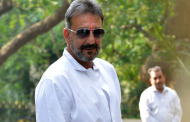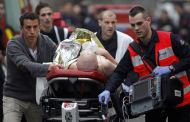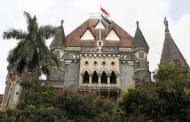Actor Sanjay Dutt, who was out on 2-weeks furlough, will go back to jail on Thursday.
He had reportedly sent a request to the authorities for an extension in the jail leave on Wednesday. He was granted a 14-day furlough on December 24, 2014.
The actor is serving 42 months of his five year sentence from May 2013 for illegal possession of arms in a case related to the 1993 serial blasts.
Sanjay has already spent over 100 days out of the jail between May 2013 to May 2014 either on furlough or parole.
Earlier, Dutt had taken furlough on medical grounds in October 2013 for 28 days, followed by a similar leave for 28 days in December 2013, to tend to his ailing wife Manyata, who was found attending a party the next day leading to protests. His wife’s purported prolonged illness prompted him to seek further parole in January this year for another 28 days.
His frequent furloughs have created much controversy within the political corridors. Even the current furlough came under the scanner of Maharashtra government.
Sanjay Dutt’s repeated parole was also questioned by the Bombay High Court in February 2014. The court had said that it was high time the rules for such relief were looked into and that there was a need for bringing in ‘radical changes’ in the Prisons Rules, 1959.
Meanwhile, Sanjay Dutt is making the most of his short stay out of jail. Taking chance of his leave from prison, Dutt partied with the team of his film PK during a special screening hosted for him. He spent New Year’s Eve partying with friends and family.
Wife Manyata hosted the bash, which was attended by their family and close friends from the industry.
Whether the celebration continues in Dutt household or not, will depend on Mumbai Police as his furlough can be extended only after its nod.
Gunmen have shot dead 12 people at the Paris office of French satirical magazine Charlie Hebdo in an apparent militant Islamist attack.
Four of the magazine’s well-known cartoonists, including its editor, were among those killed, as well as two police officers.
A major police operation is under way to find three gunmen who fled by car.
President Francois Hollande said there was no doubt it had been a terrorist attack “of exceptional barbarity”.
It is believed to be the deadliest attack in France since 1961, when right-wingers who wanted to keep Algeria French bombed a train, killing 28 people.
The masked attackers opened fire with assault rifles in the office and exchanged shots with police in the street outside before escaping by car. They later abandoned the car in Rue de Meaux, northern Paris, where they hijacked a second car.
Death threats
Witnesses said they heard the gunmen shouting “We have avenged the Prophet Muhammad” and “God is Great” in Arabic (“Allahu Akbar”).
The number of attackers was initially reported to be two, but French Interior Minister Bernard Cazeneuve later said security services were hunting three “criminals”. He said that Paris had been placed on the highest alert.
Charlie Hebdo editor Stephane Charbonnier, 47, had received death threats in the past and was living under police protection.
French media have named the three other cartoonists killed in the attack as Cabu, Tignous and Wolinski, as well as Charlie Hebdo contributor and French economist Bernard Maris.
The attack took place during the magazine’s daily editorial meeting.
At least four people were critically wounded in the attack.
People had been “murdered in a cowardly manner”, President Hollande told reporters at the scene. “We are threatened because we are a country of liberty,” he added, appealing for national unity.
French government officials are holding an emergency meeting, and President Hollande is due to give a televised address later.
The satirical weekly has courted controversy in the past with its irreverent take on news and current affairs. It was firebombed in November 2011 a day after it carried a caricature of the Prophet Muhammad.
Global condemnation
The latest tweet on Charlie Hebdo’s account was a cartoon of the Islamic State militant group leader, Abu Bakr al-Baghdadi.
Charlie Hebdo’s website, which went offline during the attack, is showing the single image of “Je suis Charlie” (“I am Charlie) on a black banner, referring to a hashtag that is trending on Twitter in solidarity with the victims.
US President Barack Obama has condemned the “horrific shooting”, offering to provide any assistance needed “to help bring these terrorists to justice”.
UN Secretary General Ban Ki-moon said: “It was a horrendous, unjustifiable and cold-blooded crime. It was also a direct assault on a cornerstone of democracy, on the media and on freedom of expression.”
UK Prime Minister David Cameron said in a tweet: “The murders in Paris are sickening. We stand with the French people in the fight against terror and defending the freedom of the press.”
The Arab League and Al-Azhar mosque, Egypt’s top Islamic institution, have also condemned the attack.
Analysis: Hugh Schofield, BBC News, Paris
Charlie Hebdo is part of a venerable tradition in French journalism going back to the scandal sheets that denounced Marie-Antoinette in the run-up to the French Revolution.
The tradition combines left-wing radicalism with a provocative scurrility that often borders on the obscene. Its decision to mock the Prophet Muhammad in 2011 was entirely consistent with its historic raison d’etre.
The paper has never sold in enormous numbers – and for 10 years from 1981, it ceased publication for lack of resources.
But with its garish front-page cartoons and incendiary headlines, it is an unmissable staple of newspaper kiosks and railway station booksellers.
Broker Hiten Dalal and Canara Bank Mutual Fund’s former General Manager B R Acharya have been sentence to one year imprisonment and directed to pay Rs three crore compensation in a 1992 securities scam case by the Bombay High Court.
Justice Roshan Dalvi, presiding over a special court, held the duo guilty yesterday and observed that the case pertains to economic offence and causing pecuniary loss to public exchequer. However, the judge acquitted five others — a broker and four officials of the bank — due to lack of evidence.
The court ordered that Dalal may be taken into custody. He is already serving sentence in jail in another case of securities scam. The CBI had accused Dalal, Acharya and others of misappropriating shares, thereby causing losses to the bank.
Acharya was convicted of criminal breach of trust and abusing his position as a public servant, while Dalal was held guilty of receiving stolen property in the form of shares.
According to CBI, around 10,000 shares purchased by Canara Bank Mutual Fund were found to be missing. Around 9,100 of the same shares were repurchased from Dalal by the bank at the instance of Acharya.
The HC asked Acharya to pay Rs 33 lakh along with 18 per cent interest per anum from the date of transaction in 1991. Similarly, Dalal was asked to pay Rs 32 lakhs with 18 per cent interest per annum from 1992.
Before the sentence was pronounced, Acharya pleaded leniency saying he was the only earning member in his family and was sick. Besides, his son was also visually impaired. Dalal said that he is already in jail undergoing punishment in another case of securities scam.
However, the court said that the duo had caused losses to the public exchequer and will have to make good the losses by paying compensation.
Lebanese social media is deeply divided after a Lebanese-American porn starlet catapulted to the top of PornHub’s search chart.
Although the Florida-based model, Mia Khalifa, 21, celebrated her rise in fame as an adult performer this week, her name became a source of controversy back in her home country. NBC/Global Post reported on the social media flurry of outrage, discomfort, and support.
Some tweets even threatened her life. “[Your] head will be cut soon inshallah,” read one. Another claimed she will be met with “Hellfire” for her actions.
Other critics were more cerebral, with one Lebanese feminist lamenting that Khalifa’s route to liberation was through sexual “exploitation.”
But her supporters were also quite vocal. One Lebanese blogger cheered on the success of a native-born adult performer at the same time that the local government cracked down on the business.
Khalifa defended herself as well:
Doesn’t the Middle East have more important things to worry about besides me? How about finding a president? Or containing ISIS?
The young model moved to the United States as a teenager and made her porn debut in October 2014.










Recent Comments